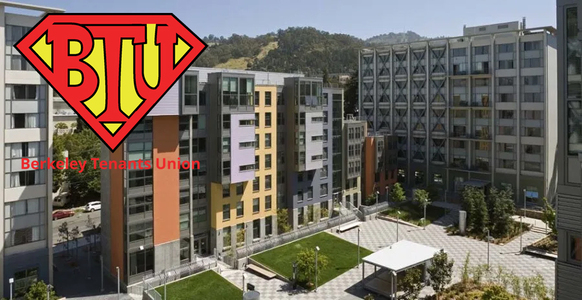100 signatures reached
To: UC Berkeley
Suspend Rent and Evictions, Open the UCB Dorms to Homeless Students

The University must
1. Ban ALL evictions in university housing except the rare, urgent case in which the tenant is alleged to be seriously endangering others; and
2. Relieve ALL tenants of University housing of their rent, without a requirement to repay it; and
3. Use the numerous current vacancies in the university housing to provide free housing for homeless and housing insecure students; and
4. Explicitly apply these policies to graduate student and family housing; and
5. Maintain these policies through AT LEAST 90 days following the conclusion of the local state of emergency (until the resumption of in-person classes in the case of #3).
1. Ban ALL evictions in university housing except the rare, urgent case in which the tenant is alleged to be seriously endangering others; and
2. Relieve ALL tenants of University housing of their rent, without a requirement to repay it; and
3. Use the numerous current vacancies in the university housing to provide free housing for homeless and housing insecure students; and
4. Explicitly apply these policies to graduate student and family housing; and
5. Maintain these policies through AT LEAST 90 days following the conclusion of the local state of emergency (until the resumption of in-person classes in the case of #3).
Why is this important?
UC Berkeley, the city of Berkeley, and the entire country (not to mention the world) are going through both an economic meltdown and a public health crisis due ongoing coronavirus pandemic. Many tenants - including UC Berkeley students - are unable to pay their rent as a result of the economic meltdown and shelter-in-place order. Furthermore, so many students live paycheck-to-paycheck that they could never afford the added expense of paying backrent. Many of these students also do not have a "non-Berkeley home" they can return to.
The federal Department of Housing and Urban Development has responded by banning evictions (and defaults) in properties secured by Federal Housing Administration-insured (Fannie and Freddie) Single Family mortgages. On March 17, the Berkeley City Council passed an initial moratorium on evictions and suspended rent payments for tenants who been financially impacted by the coronavirus pandemic; the city council is expected to pass additional emergency legislation to strengthen the law to protect Berkeley residents and keep them in their homes.
As a state agency, the university is generally exempt from regulations issued by a local government. As a result, the only way to protect students in university housing from evictions and unconscionable rent collections is for the university to voluntarily enact such a policy.
Letting homeless and housing-insecure students live for free in otherwise empty university housing would only cost the university little to nothing. Additionally, the fact that the University is allowing students to move-out and receive a pro-rata refund means it is already budgeting for little to no revenue from housing for the remainder of the year. It is therefore clearly within the Univeristy's means to allow students already living in the dorms to not owe rent. Many students cannot simply move-out of the dorms and "go back home." For instance, they may not have another home to return to, may have a Bay Area job they need to support themselves and/or their family and which has not been halted by the pandemic, or their family home may be unsafe (e.g. if they've been rejected by their family for not being cis-hetero or if their family home is physically dangerous).
This is literally a matter of life and death. If students are forced out onto the streets - either through a formal eviction or because they decide to move out early in order to avoid back rent they cannot repay, they could catch coronavirus and die, as well as infect other community members.
The federal Department of Housing and Urban Development has responded by banning evictions (and defaults) in properties secured by Federal Housing Administration-insured (Fannie and Freddie) Single Family mortgages. On March 17, the Berkeley City Council passed an initial moratorium on evictions and suspended rent payments for tenants who been financially impacted by the coronavirus pandemic; the city council is expected to pass additional emergency legislation to strengthen the law to protect Berkeley residents and keep them in their homes.
As a state agency, the university is generally exempt from regulations issued by a local government. As a result, the only way to protect students in university housing from evictions and unconscionable rent collections is for the university to voluntarily enact such a policy.
Letting homeless and housing-insecure students live for free in otherwise empty university housing would only cost the university little to nothing. Additionally, the fact that the University is allowing students to move-out and receive a pro-rata refund means it is already budgeting for little to no revenue from housing for the remainder of the year. It is therefore clearly within the Univeristy's means to allow students already living in the dorms to not owe rent. Many students cannot simply move-out of the dorms and "go back home." For instance, they may not have another home to return to, may have a Bay Area job they need to support themselves and/or their family and which has not been halted by the pandemic, or their family home may be unsafe (e.g. if they've been rejected by their family for not being cis-hetero or if their family home is physically dangerous).
This is literally a matter of life and death. If students are forced out onto the streets - either through a formal eviction or because they decide to move out early in order to avoid back rent they cannot repay, they could catch coronavirus and die, as well as infect other community members.
How it will be delivered
Presumably electronically, given the ongoing coronavirus pandemic.
